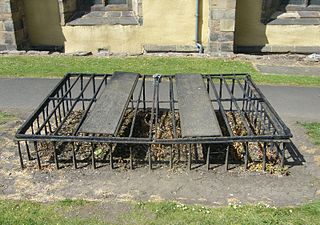 WEST BROMWICH, ENGLAND—While moving a nineteenth-century cemetery in the West Midlands, England, to make room for a new road, archaeologists found that some of the bodies had been buried with protective devices to deter grave robbers. At the time, fresh bodies could be dug up and sold to medical schools. One of the devices, called a mortsafe, was a metal cage fixed around the coffin of a young woman who suffered from a skin and bone disease. Her condition would have made her corpse desirable. Another grave contained a brick coffin with a false bottom that protected two bodies. “The simplest method of protecting the graves was to employ a guard. However it appears from records in other towns that the money paid for a fresh body, which could be over £25, that these guards were often bribed to turn a blind eye,” said Frank Caldwell, Sandwell Council’s Museums Manager.
WEST BROMWICH, ENGLAND—While moving a nineteenth-century cemetery in the West Midlands, England, to make room for a new road, archaeologists found that some of the bodies had been buried with protective devices to deter grave robbers. At the time, fresh bodies could be dug up and sold to medical schools. One of the devices, called a mortsafe, was a metal cage fixed around the coffin of a young woman who suffered from a skin and bone disease. Her condition would have made her corpse desirable. Another grave contained a brick coffin with a false bottom that protected two bodies. “The simplest method of protecting the graves was to employ a guard. However it appears from records in other towns that the money paid for a fresh body, which could be over £25, that these guards were often bribed to turn a blind eye,” said Frank Caldwell, Sandwell Council’s Museums Manager.